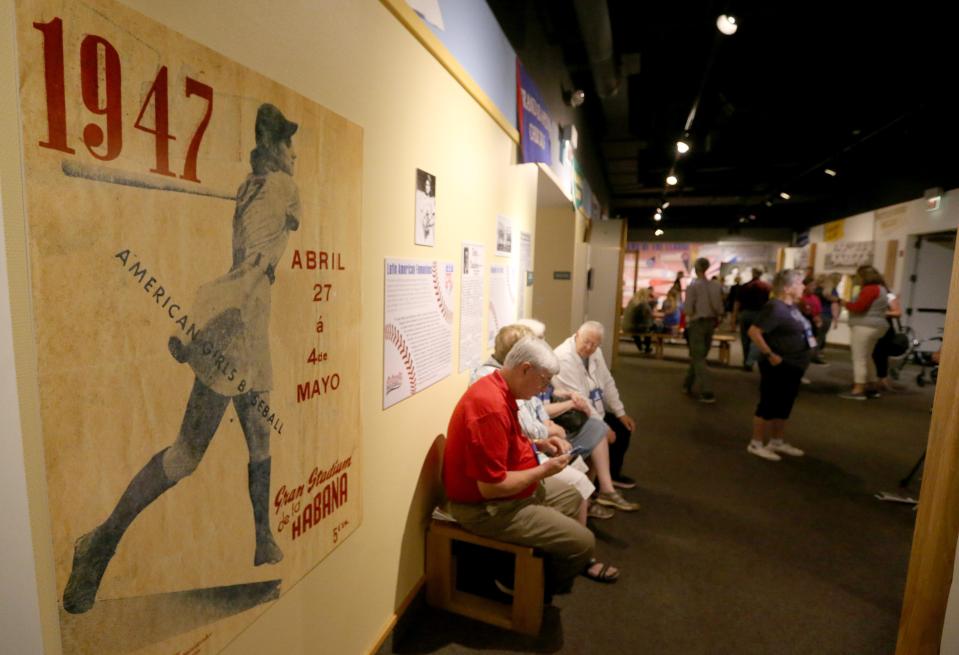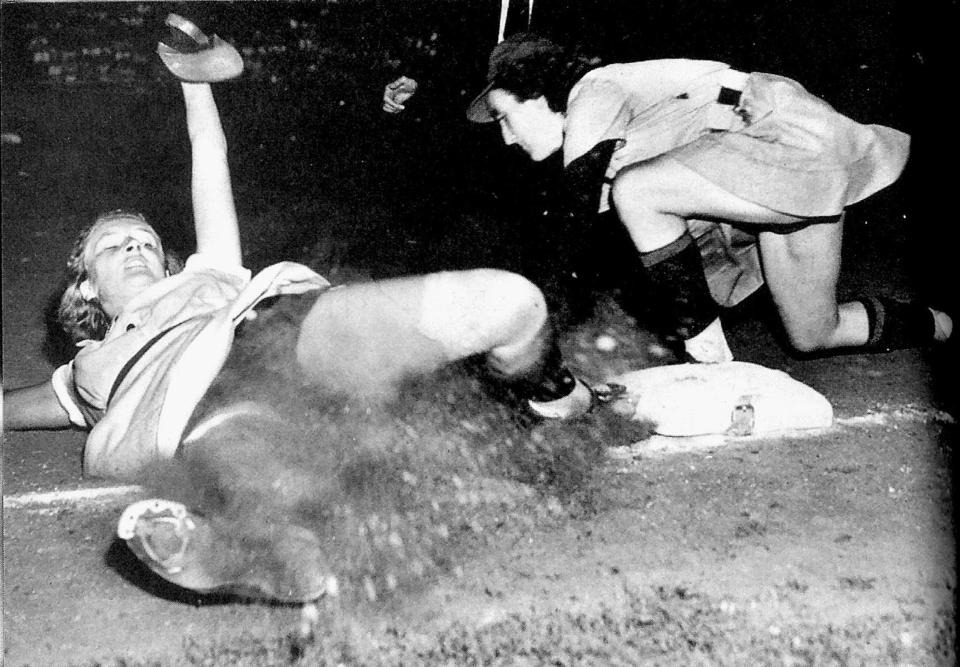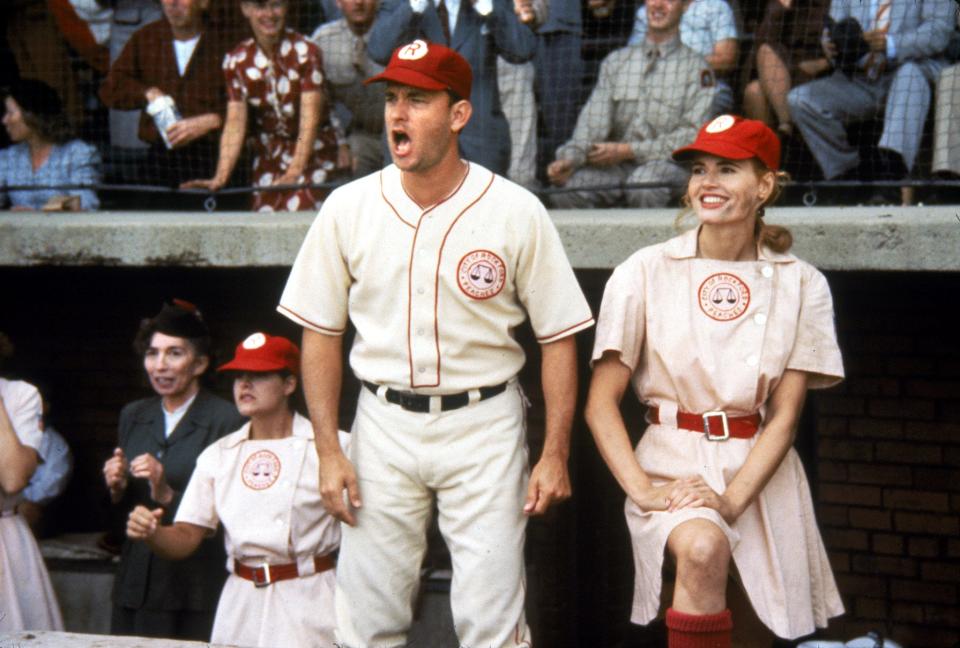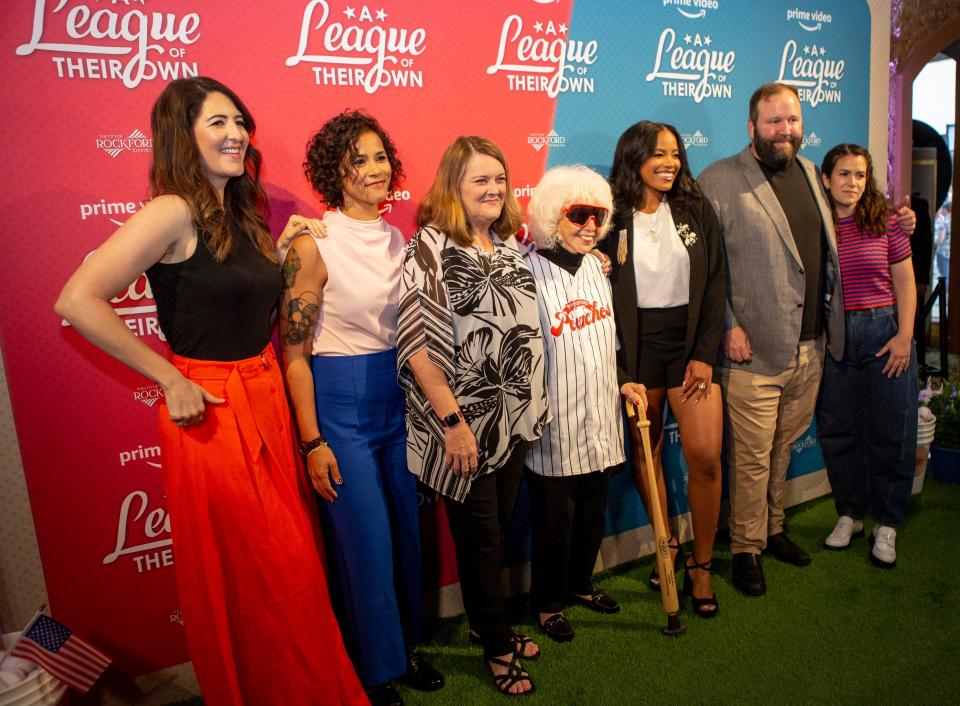From Title IX to LGBTQ inclusion: How AAGPBL helped change trajectory of women's sports
The league’s rules demanded its players appear “feminine” and not “boyish,” take charm school lessons and play baseball while wearing shirts.
Despite "Rules of Conduct" that seem laughable now, the All-American Girls Professional Baseball League of the 1940s and '50s helped pave the way for a women’s sports landscape that today includes the WNBA, the NWSL and the women’s World Cup tournament.
"The current generation of women that are playing in high school and college and even in Little League owe a debt of thanks to these women (who played in the AAGPLB)," Peter Dreier, who cowrote the 2022 book "Baseball Rebels: The Players, People, and Social Movements That Shook Up the Game and Changed America", told USA TODAY Sports.
"They took their experience and they translated it into being advocates for Title IX for women playing all kinds of different sports."

AAGPBL players went on to college, advocated for women’s rights
According to a 2005 article in Women’s Studies Quarterly, 35 percent of the league’s 600 players went on to earn college degrees, compared to 8.2 percent of women of their generation. Fourteen percent of AAGPBL players earned graduate degrees.
"A lot of them went to college, a lot more than the typical working-class women at the time," said Dreier, a politics professor at Occidental College in Los Angeles. "A lot of them became schoolteachers or university teachers, often in physical ed."
STAY UP-TO-DATE: Subscribe to our Sports newsletter now!
Dreier said the AAGPBL was a catalyst for the women’s rights movement because so many former players "were out there on the front lines" pushing for Title IX, the 1972 federal civil rights law that prohibits sex-based discrimination in education programs and activities.
AAGBPL founded as men were entering World War II
Born out of fear that professional baseball in the U.S. might be shut down as military service-aged men were getting drafted for World War II, the AAGPBL began as the All-American Girls Softball League in the spring of 1943.
Chicago Cubs owner and chewing gum mogul Philip K. Wrigley helped found the league that embraced its "baseball league" moniker midway through the first season and lasted until 1954.
Teams were based in Midwest in states such as Illinois, Wisconsin, Indiana and Michigan.
In recruiting players from amateur softball leagues across the United States, Canada and even Cuba, the AAGPBL rejected players who didn’t meet its standard of femininity.
"The stereotypes were awful," Dreier said. "One magazine (in 1943) called these players in softball leagues ‘uncouth Amazonians.’ That’s not even a subtle bigoted comment."

AAGBPL’s 'Rules of Conduct' focused on femininity
With allyship across women’s sports and more support for the LGBTQ+ community, women athletes today don’t have as much to fear by being publicly out. That certainly wasn't the case for players in the AAGPBL.
League rules were designed, at least in part, to keep out lesbian players or pretend they didn’t exist:
"ALWAYS appear in feminine attire when not actively engaged in practice or playing ball."
"Boyish bobs are not permissible."
"Lipstick should always be on."
"All social engagements must be approved by chaperone. Legitimate requests for dates can be allowed by chaperones."
"Wrigley and the other guys that ran the league – and it was all guys – they bent over backward to try to make the women look like All-American girls next door," Dreier said. "It was quite amazing the extent to which they went to deny the reality that there were lesbians playing on every team."
And the AAGPBL was quick to discard players if they eschewed the rules.
For example, South Bend Blue Sox outfielder Josephine "JoJo" D'Angelo was approached by a league official in a hotel lobby in 1944 and told she was being released for having a "butchy haircut."
AAGBPL’s gay players came out later in life
It’s not known exactly how many AAGPBL players were gay, but the words in some obituaries included on the league’s website offer a glimpse:
Eunice Taylor "is survived by her partner of 45 years, Diana Walega."
Barb Sowers "was preceded in death by her loving companion of 45 years, Shirley Ann Weaver."
Mabel Holle “is survived by her longtime partner, Linda Hoffman.”
June Peppas "and her life partner of 46 years, Polly Huitt, operated their own printing business."
"Some of them were out to their friends and some of their teammates, but most of them were in the closet," Dreier said. "A lot of players in the league only came out in their obituaries."
One former AAGPBL player’s love story inspired a 2020 Netflix documentary – "A Secret Love" – about Terry Donahue, who played for the Peoria Redwings, and Pat Henschel, her decades-long partner.
The couple met and fell in love in 1947 but didn’t disclose their relationship to their family until 2009.
"All those girls were tremendous athletes, and at that point in the '40s being gay was taboo," Chris Bolan, the documentary’s director and Donahue’s great-nephew told Canada’s CBC in 2020. "It was dangerous (to come out), lives were ruined."
'A League of Their Own', the movie and the series
According to her 2003 obituary, Dottie Ferguson of the Rockford Peaches was one of the inspirations for the "All the Way" Mae Mordabito's character played by Madonna in "A League of Their Own."

The iconic 1992 movie, which introduced many fans to the AAGPBL, did not include any portrayals of lesbian characters.
But last year’s Amazon Prime Video Series by the same name did address sexuality and race (the AAGPBL did not have any Black players even after Jackie Robinson broke MLB’s color barrier in 1947).
Maybelle Blair, who played for the Peoria Redwings, was a consultant on the series and came out as gay in 2022 during a panel discussion for the show's Tribeca Film Festival premier at age 95.
In a 2022 interview with Entertainment Tonight, Blair credited Abbi Jacobson, the show’s star and co-creator, and fellow co-creator Will Graham with prompting her to come out.
"If it hadn't been for Will and Abbi and all of them making the new series ... I would have never come out in my life," said Blair, who added that Penny Marshal, the original film's director, "would have loved to have shown (lesbian players), but in her day, it wasn't accepted. Even in the early 1990s."
Backlash to progress but also hope for the future
Amid today’s expansion of professional women’s leagues and publicly out players, there has also been a surge of anti-LGBTQ+ legislation seemingly more fitting to the time in which the AAGPBL operated.
"Any time there is a progressive movement … there’s always a backlash of people that are trying to move it backwards," Dreier said. "But they can’t move it all the way back, but they try. They’re threatened by the success of these groups."
Dreier said what he called the "reactionary movement" in the U.S. ultimately will be unsuccessful in rolling back recent advancements in LGBTQ+ rights.
"We’re going to see eventually women managing and coaching Major League Baseball," Dreier said. "Somewhere in Little League today or in high school today, there’s an 8-year-old girl or a 17-year-old pitcher or outfielder woman or these few women that are playing in college on baseball teams, somewhere one of these people is going to be the Jackie Robinson of women in baseball."

This article originally appeared on USA TODAY: How AAGPBL of 1940s, '50s helped pave way for Title IX, women's sports

